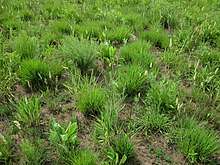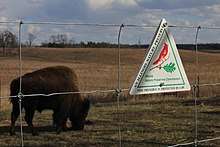Nachusa Grasslands
The Nachusa Grasslands is a 3,800 acres (1,500 ha) tallgrass prairie conservancy located near Franklin Grove in Lee County and Ogle County, Illinois. It is managed by The Nature Conservancy staff and volunteers.[1]
| Nachusa Grasslands | |
|---|---|
 Bison at Nachusa | |
 Location within the state of Illinois | |
| Nearest city | Franklin Grove |
| Coordinates | 41°53′28″N 89°20′37″W |
| Established | 1986 |
| Governing body | The Nature Conservancy |
History

Most of northern Illinois was tallgrass prairie at the time of statehood in 1818. In the ensuing century, the vast majority of this prairie was plowed up for arable farmland. A Nature Conservancy planning process, aimed at building a restored tallgrass prairie ecosystem in Illinois, commenced in 1985; the first major land acquisition, of 400 acres (160 ha), occurred in 1986.[2] More acreage has been added to create the current open space of 3,800 acres (1,500 ha).[1]
Bison reintroduction

The Nachusa Grasslands planning process called for running up to 100 American bison (commonly known as "buffalo") on approximately 1,500 acres (610 ha) of the preserve.[3] Thirty bison were released on the Nachusa Grasslands in October 2014.[4] The bison were added to the approximately 700 species logged at the prairie. In April 2015, free-range bison calves were born, adding to hope that the Nachusa herd could be managed so as to be self-sustaining.[5] As of July 2015, 14 calves have been born at Nachusa.[6]
See also
References
- "Friends of Nachusa Grasslands". Retrieved 2020-01-03.
- Esarey, Sharman (October 21, 1989). "New Prairie Created From Ground Up". Los Angeles Times.
- Gregory, Ted (September 20, 2015). "Native bison roam again on restored prairie west of Chicago". Los Angeles Times.
- Gregory, Ted (October 6, 2014). "After a century, bison return to Illinois". Chicago Tribune.
- Gregory, Ted (April 8, 2015). "Baby bison is Illinois' first in nearly two centuries". Chicago Tribune.
- Gregory, Ted (July 3, 2015). "Illinois bison busy as rabbits, prairie ambassadors". Chicago Tribune.